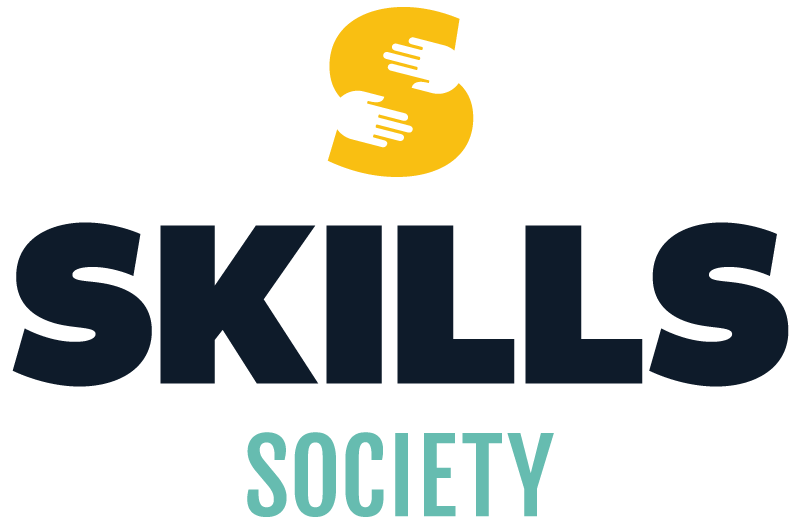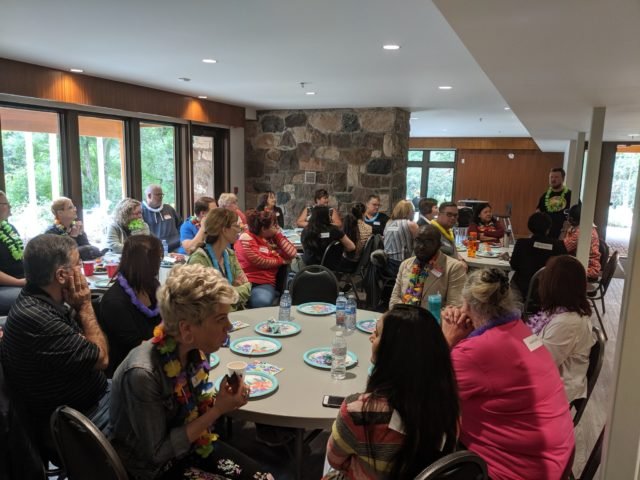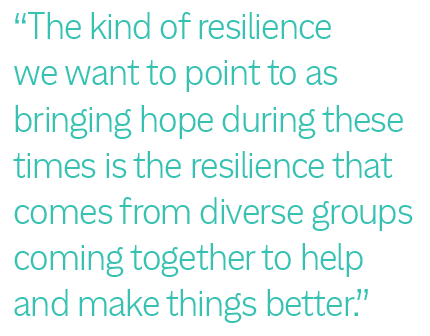Executive Director 2020 AGM Report
ADAPT & EVOLVE: Navigating Adversity and Building Resilience Together
In reflecting back on the year, and the fact that we’re still faced with uncertainties related to COVID-19, the title for this year’s report highlights both the stark reality of today and hope as we move forward together.
This year’s report aims to communicate two important messages to our Skills Society community. The first is to share a bit about our Skills Society values refresh and our 3-year strategic plan that has emerged from creative collaborations between the board of directors, Skills leadership, and stories from interviews with a cross section of people from our Skills community over the last year. We are excited and proud to share these values with you.
The second message I’d like to convey is all the ways our organization has been navigating through the COVID-19 Pandemic. It is a remarkable story of resilience and showcased Skills at its very best.
In addition - and as usual - our annual report also showcases some inspiring stories and insights from the year which is often the best part!
My most important message: thank you.
I really want to thank and acknowledge the people we serve, their families and guardians, and our stellar employees for their patience, kindness, creativity and support during this pandemic. As you might guess, this has been an exceptionally difficult time for everyone - but the unwavering dedication of everyone at Skills to ensuring people with disabilities are protected and supported has given me unending amounts of hope and gratitude. On behalf of the entire leadership team of Skills Society, THANK YOU!
In August 2019 we hosted a gathering for Team Leaders – a time to express appreciation for all their hard work and build connection with food, games, and socializing!
SKILLS SOCIETY CORE
VALUES REFRESH
Sometimes the values of an organization tend to reflect what already exists at its core. In other organizations, values are aspirational and reflect how they want to show up in the world. Our core values at Skills have always been a mix of aspirational and foundational, consistent with what I’ve heard is important to our community. We need a good mix of the old and new - sustaining the good things and moving forward with vision and values that guide us into a positive future.
In learning from the people we support, our employees and the Board over this past year, we recognized we needed to refresh and clarify a few pieces with our five core values. It was clearly and consistently raised that we need to demonstrate how our values show up in ‘real life.’ These are the operating principles you see reflected on pages 9-10. Another important part of our refresh was to fill gaps in two critical areas: first in reiterating our commitment to person-centered practice, and the second in formalizing our mission to adapt and evolve to meet changing needs. We reconfirmed our commitment to our three previous values, but provided clarity on how they show up in our work through the operating principles.
In the coming year and after the pandemic subsides we will be exploring with employees in our Skills Illustrated course, and other ways, how we can increase understanding and practice of our values in action. Further is a bit about the two new refreshed values.
Skills Value: Practice in Person-centered Ways
This is important because often in disability services, services and supports are not co-created alongside the people we serve. Throughout the organization - from the front line to policy making - we strive to ensure we listen and centre the voices of those served. This is a delicate practice and very often, even with the best of intentions, our biases can get in the way of deeply listening and seeing what people need and want in order to thrive. There is also an added complexity in that often if people have lived lives where “experts” constantly advised what people should or shouldn’t do, simply asking people what they need and want is often not enough. We need to start with asking, but also need to listen through noticing better what people show us they value through non-verbal communication. This might mean spending time to learn together, going somewhere new and experiencing what people gravitate towards and what that might tell us about their values and interests. Sometimes we also need to show people possibilities and expand horizons by trying new things in order to learn what people like, and don’t like. Put simply, this means avoiding a one-size-fits-all model. I encourage you to learn more about how we operationalize this value in the values refresh section of the report.
Skills Value: Adapt & Evolve
Never has this value been more important than today. Ironically however, this value has been deeply part of Skills for over 40 years since we began figuring out ways to support and include people with disabilities in community life. What does it really mean in our context to adapt and evolve? It means we need to be keenly aware of changes and respond thoughtfully. It involves constantly learning and adapting to the experiences of the people we serve. It means responding to changes in society that shift attention, focus and values. And it means being nimble and responsive when changes come to the systems that affect us. Life is never static and if we don’t listen, watch, and pay attention to shifts and changes, our supports and services may no longer be relevant. Again, I encourage you to read more about how we operationalize this value in the values refresh section of the report.
STRATEGIC PRIORITIES OVER THE NEXT 3 YEARS
While many organizations refresh their strategic priorities, not many are as inclusive or collaborative as Skills. I’m quite proud of the commitment of the Board and our leadership team to gather insights in multiple ways - input that helped shape our strategic priorities. Paige Reeves led focus groups with a cross section of people we support, along with front line staff and our leadership team. I interviewed every manager and senior manager to learn from their perspective what we needed to pay attention to. Our board chair interviewed all board members. Using all of these insights, we were able to make sense of what matters to our Skills Society community through a mix of rich data and personal stories. This was a very iterative process with many tweaks and feedback loops until we landed on the current plan. We also wanted to ensure that any plan we developed was flexible to adapt to changing contexts, recognizing that too often strategic plans can be too rigid and mismatched with a changing world. This is one reason we added the ‘adapt and evolve’ value to ensure we are responsive. Sure enough within a few months of finalizing our values refresh and strategic priorities, COVID-19 hit. A full pandemic being something no one (except maybe Bill Gates) could have predicted being our reality 6 months ago. And so, our strategic priorities will guide our work but at the same time we are committed to adapting and evolving to ensure we’re focusing on the right things at the right times.
A great example of our core value “Build and Share Knowledge” in action – Evan, Manager of Community Supports, travelled to Phoenix, Arizona for the TASH Conference where he shared MyCompass Planning with other disability service organizations from across North America.
OUR LIFE’S WORK AND THE CULTURE TO ENABLE US TO SUCCEED
The ongoing priorities of our plan are a mix of the deep life’s work of our organization and building an organizational culture that allows us to thrive. In order to strengthen our capacity to support citizenship, inclusion and deep belonging we need an innovative culture, continuous improvement and learning and a high level of trust like you’d find in any family. This creates a stronger sense of purpose to support people with disabilities to have good lives.
BALANCING THE BIG PICTURE AND ON THE GROUND NEEDS
Our new and emerging priorities will allow us to respond to the immediate needs of the people we serve while at the same time enabling us to drive big picture change at the systems level. Here is a bit of context for why each of these priorities is important.
Strategically manage our work with people with complex needs
When PDD eligibility criteria changed a few years ago, the PDD system began to ask how service providers might support and serve more people with what PDD calls Complex Service Needs.
Skills stepped up early in the process and developed many innovative supports to serve folks with these needs. The PDD system was not originally designed to support complex service needs and so we have had to balance safely serving this population with the security of our employees and community. Our work to serve, support and advocate for this community continues to be an ongoing focus.
Increase financial management and resilience
Nonprofits like Skills must constantly work towards financial resilience in order to sustain their work and accomplish their vision. We will be researching and working on robust fund development and resilience plans over the coming three years. Our goal with this work is to balance not overburdening employees with fundraising while at the same time working on creating a long-term, resilient fund-development culture.
Get to the next level in data and evaluation
As I said in last year’s report, there is a reason our sector has a long history of distrust towards the word “data”. Quantitative measures were often used to oppress people with disabilities or to oversimplify complex things like measuring if a person’s quality of life was increasing or decreasing. Having said that, it is important for Skills to grow a better data culture that embraces lived experience stories and explores new ways of evaluating our success in supporting people to have deep belonging, connection and support. With in-house tools like MyCompass Planning that centers the voice of people served, we are well positioned to lead a meaningful data revolution in the social sector. A revolution that makes data empowering and provides deeper listening and learning. We are excited to lead the way in this area - and in systems further out - to make the world more equitable.
Advance sector priorities
We have always looked to be systems change makers to improve quality of life for marginalized populations. We seek creative collaborations with people with disabilities, government, and our service provider colleagues. When we’re at the table together, we can help make systems and services better for people with disabilities.
Be ready to adapt our organizational models
This priority really came to life with COVID-19 emerging. Thanks to the leadership in this great organization, we had to temporarily restructure our entire organization in a matter of weeks in order to keep people safe. We are always on the lookout for ways we can be more responsive, adapt and evolve our service models to meet the needs of the people we serve and the conditions in which we operate.
There are many more details at an operational level of how we are moving forward with these priorities and we will be evaluating progress along the way and sharing back on key milestones.
ADAPTING AND EVOLVING IN THE TIME OF COVID-19
Navigating adversity and building resilience together
What does it mean to build resilience together in an adverse circumstance like facing COVID-19? Most often in society when resilience comes up, we think of it as an individual overcoming adversity and their resilience as they push through their struggles. If you google image search resilience images, the most common is of a single little plant growing out of a broken or cracked earth or sidewalk. In fact we almost had that image on the front cover of this report - but felt something was missing from the picture. It was lonely and didn’t capture the spirit of “all being in this together.” We realized the kind of resilience we were talking about and wanted to point to as a hope during these times was the resilience that comes from diverse groups coming together to help and make things better. As you can see in the image on the front cover, it shows many people coming together to build a path over a chasm. I like to think this is a path where no one is left out or left behind. This has been what our Skills Society community and the greater Edmonton community has done in response to COVID-19. We have stepped up to help each other - bringing in our individual gifts and support as a collective. We are more resilient together as a community, than trying to face a challenge alone. I also reflect that as humans we have empathy and survived over generations not by being alone, but because we adapted and evolved as communities working together. In some ways maybe this pandemic will reset us a bit and help us remember the deep importance of service to our communities and that we are all interconnected and need to take care of each other.
It’s also important to remember that people with disabilities historically have not always been welcomed and valued as full citizens in society. As the pandemic subsides (fingers crossed) we need to remember how important it is to keep searching for ways to meaningfully include people in community life - no matter how isolated we might be. It is a reminder for all of us that there is still work to do on ensuring no-one is left behind and we are more resilient when we are together, not alone.
Sincere gratitude to everyone in our Skills community for building resilience together. For helping each other. For looking out for each other. For helping people feel connected even when they are physically apart. For safeguarding and protecting people. We will get through this - and I’m certain we can face anything that comes our way because our community is looking out for each other.
Ben Weinlick,
Executive Director

Ben Weinlick,
Executive Director










